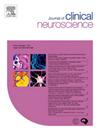Intravenous ketamine infusions in patients with depression and Epilepsy: Case series
IF 1.9
4区 医学
Q3 CLINICAL NEUROLOGY
引用次数: 0
Abstract
Background
Mood disorders affect approximately one-third of individuals with epilepsy, posing an increased risk of suicide. There is an unquestionable need for more effective antidepressant treatment in this group of patients. This study explores the safety and tolerability of low-dose intravenous ketamine in six patients with comorbid depression and epilepsy. This report is limited to the post-hoc observation of six patients only. Thus, no causative conclusions are warranted, and prospective, large sample studies are needed to demonstrate the effect of ketamine on seizures, depression, and side effect profile along with the systematic outcome measures assessment.
Methods
Six patients diagnosed with major depressive disorder (MDD) or bipolar disorder I (BP-I) and concurrent epilepsy received a series of eight intravenous ketamine infusions alongside their standard antidepressant, mood stabilizer, and antiseizure medications.
Results
The observed side effects were mild and transient, with no exacerbation of epilepsy noted. No serious adverse events occurred. Four patients experienced a significant reduction in Montgomery–Åsberg Depression Rating Scale (MADRS) scores, two achieving full remission. Three patients reported a subjective decrease in seizure activity during the twelve-month follow-up.
Conclusions
Short-term intravenous ketamine treatment demonstrated favorable safety and tolerability profile with clinical efficacy in six patients with depression and epilepsy.
静脉注射氯胺酮治疗抑郁症和癫痫患者:病例系列。
背景:大约三分之一的癫痫患者会出现情绪障碍,从而增加了自杀的风险。毫无疑问,这类患者需要更有效的抗抑郁治疗。本研究探讨了低剂量静脉注射氯胺酮对六名合并抑郁症和癫痫的患者的安全性和耐受性。本报告仅限于对六名患者进行事后观察。因此,不能得出因果关系的结论,需要进行前瞻性的大样本研究,以证明氯胺酮对癫痫发作、抑郁和副作用的影响,并进行系统的结果评估:六名被诊断为重度抑郁障碍(MDD)或双相情感障碍 I(BP-I)并同时患有癫痫的患者在接受标准抗抑郁剂、情绪稳定剂和抗癫痫药物治疗的同时,接受了八次氯胺酮静脉注射:结果:观察到的副作用是轻微和短暂的,没有发现癫痫加重。未发生严重不良事件。四名患者的蒙哥马利-阿斯伯格抑郁量表(MADRS)评分明显降低,其中两名患者的评分完全缓解。在为期12个月的随访中,3名患者主观感觉癫痫发作活动有所减少:结论:对六名抑郁症合并癫痫患者进行短期静脉注射氯胺酮治疗具有良好的安全性和耐受性,而且临床疗效显著。
本文章由计算机程序翻译,如有差异,请以英文原文为准。
求助全文
约1分钟内获得全文
求助全文
来源期刊

Journal of Clinical Neuroscience
医学-临床神经学
CiteScore
4.50
自引率
0.00%
发文量
402
审稿时长
40 days
期刊介绍:
This International journal, Journal of Clinical Neuroscience, publishes articles on clinical neurosurgery and neurology and the related neurosciences such as neuro-pathology, neuro-radiology, neuro-ophthalmology and neuro-physiology.
The journal has a broad International perspective, and emphasises the advances occurring in Asia, the Pacific Rim region, Europe and North America. The Journal acts as a focus for publication of major clinical and laboratory research, as well as publishing solicited manuscripts on specific subjects from experts, case reports and other information of interest to clinicians working in the clinical neurosciences.
 求助内容:
求助内容: 应助结果提醒方式:
应助结果提醒方式:


